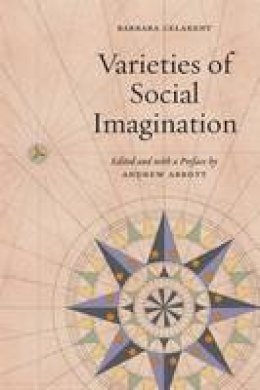
Stock image for illustration purposes only - book cover, edition or condition may vary.
Varieties of Social Imagination
Barbara Celarent
€ 44.23
FREE Delivery in Ireland
Description for Varieties of Social Imagination
Paperback. Num Pages: 320 pages. BIC Classification: JHB. Category: (P) Professional & Vocational. Dimension: 228 x 152. .
In July 2009, the American Journal of Sociology (AJS) began publishing book reviews by an individual writing as Barbara Celarent, professor of particularity at the University of Atlantis. Mysterious in origin, Celarent's essays taken together provide a broad introduction to social thinking. Through the close reading of important texts, Celarent's short, informative, and analytic essays engaged with long traditions of social thought across the globe from India, Brazil, and China to South Africa, Turkey, and Peru...and occasionally the United States and Europe. Sociologist and AJS editor Andrew Abbott edited the Celarent essays, and in Varieties of Social Imagination, he brings the work together for the first time. Previously available only in the journal, the thirty-six meditations found here allow readers not only to engage more deeply with a diversity of thinkers from the past, but to imagine more fully a sociology and a broader social science for the future.
Product Details
Publisher
University Of Chicago Press
Format
Paperback
Publication date
2017
Condition
New
Number of Pages
320
Place of Publication
, United States
ISBN
9780226433967
SKU
V9780226433967
Shipping Time
Usually ships in 7 to 11 working days
Ref
99-50
About Barbara Celarent
The late Barbara Celarent was professor of particularity at the University of Atlantis. Andrew Abbott is the Gustavus F. and Ann M. Swift Distinguished Service Professor at the University of Chicago. For fifteen years, he was editor of the American Journal of Sociology.
Reviews for Varieties of Social Imagination
A social scientist of outstanding culture, Abbott takes us in his reading room to revive a wonderful diverse set of authors and works, mostly non-Westerners. The reward is twofold. First, the selection paves the way for a global history of social thought. And second, Abbott's masterful art of reading proves itself to be a heuristic that makes for better conversation between scholarship and imagination.
Pierre-Michel Menger, Coll ge de France (Paris) Varieties of Social Imagination is a beautiful book
deeply learned, deeply original, and deeply humane. If the 'roots of humane social science, ' as the wise Barbara Celarent suggests, 'lie in translation, in making the systematic leap from one social standpoint to another, ' then this book is both a compelling exercise in translation and a distinctive contribution to a humane social science.
Rogers Brubaker, University of California, Los Angeles Like R mulo Gallegos's Do a Barbara, Do a Barbara Celarent comes 'de m s lejos que m s nunca' to reconstitute social thought to its integrity. Her recovery and analysis of odd or forgotten clairvoyant English-speaking social scholars, or her going beyond the 'English only' comfort zone, introducing thought-provoking Nairobi, Mexican, Brazilian, Chinese or Peruvian thinkers, reveal the often-missed blend of echoes and voices that deciphering human societies has necessarily encompassed. Varieties of Social Imagination is an enchanting reading that reinstalls the meaning of erudition that the true sociological imagination demands.
Mauricio Tenorio-Trillo, University of Chicago
Pierre-Michel Menger, Coll ge de France (Paris) Varieties of Social Imagination is a beautiful book
deeply learned, deeply original, and deeply humane. If the 'roots of humane social science, ' as the wise Barbara Celarent suggests, 'lie in translation, in making the systematic leap from one social standpoint to another, ' then this book is both a compelling exercise in translation and a distinctive contribution to a humane social science.
Rogers Brubaker, University of California, Los Angeles Like R mulo Gallegos's Do a Barbara, Do a Barbara Celarent comes 'de m s lejos que m s nunca' to reconstitute social thought to its integrity. Her recovery and analysis of odd or forgotten clairvoyant English-speaking social scholars, or her going beyond the 'English only' comfort zone, introducing thought-provoking Nairobi, Mexican, Brazilian, Chinese or Peruvian thinkers, reveal the often-missed blend of echoes and voices that deciphering human societies has necessarily encompassed. Varieties of Social Imagination is an enchanting reading that reinstalls the meaning of erudition that the true sociological imagination demands.
Mauricio Tenorio-Trillo, University of Chicago
